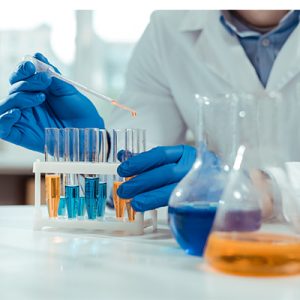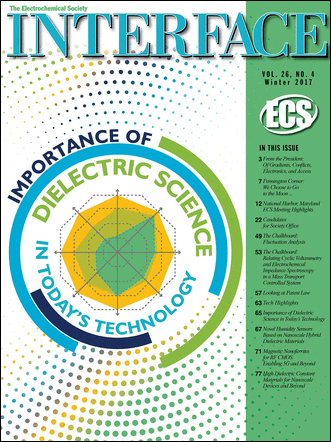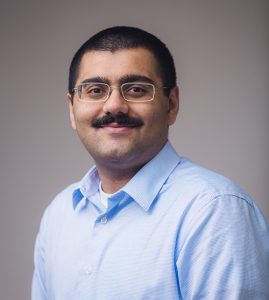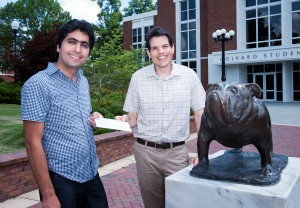The Electrochemical Society (ECS) announces the awarding of the 2021 ECS Summer Fellowships. These fellowship awards assist students in the months of June through August pursue work of interest to the Society. The recipients must be enrolled in a college or university and a member of ECS. At the end of the award period, the recipients are required to submit a brief resume or abstract suitable for publication in The Electrochemical Society Interface concerning the work performed during the fellowship period. (more…)
The ECS Summer Fellowship Program assists students during the summer months of June through September to pursue work in a field of interest to ECS. The 2020 fellowship recipients are:
Edward G Weston Fellowship
“Towards Quantifying Ion Kinetics at Confined Nanointerfaces using Electrochemical Fluctuation Methods”
Andrew Pendergast (more…)
 Application Deadline: January 15, 2020
Application Deadline: January 15, 2020
It’s hard to think about summer in the depths of winter, but summer will be here before you know it! The summer months can be a great time to further your career. You may be eligible for an ECS Summer Fellowship which supports graduate students from June through September who pursue work in a field of interest to The Electrochemical Society.
ECS has been offering summer fellowships since 1928. Today, as many as five recipients are selected annually to receive up to $5,000. Qualified applicants must be enrolled in a college or university, and be a member of ECS. Preference is given to activities that extend the scope of the applicant’s program of study such as tangential research topics or summer research at another institution. Review the candidate qualifications and award rules to see if you qualify!
If you meet the requirements, apply for an ECS Summer Fellowship today! ECS uses an electronic application system. The deadline is January 15, 2020. (more…)
Summer 2018 was a good one for Aashutosh Mistry and Haegyeom Kim. Both were awarded ECS Summer Fellowships to further explore their research within a lab and to advance within their fields.
“The ECS Summer Fellowship program offered me the time and money to explore questions and pursue research I couldn’t explore during my PhD. Without the fellowship, I couldn’t have done this,” says Aashutosh Mistry, a PhD student at Purdue University.
Mistry is one of five recipients of the 2018 ECS Summer Fellowship program designed to assist students during the summer months, June through August, in the pursuit of work in a field of interest to ECS. He is just one example of how the fellowship directly effects and encourages young researchers to explore and expand their studies.
Mistry explains that during his PhD study, he’d often discover problems he thought were worth pursuing. However, because these problems were not considered part of the main objective of the project, and also considering deadlines and time constraints, Mistry did not have the flexibility to explore these questions.
“You often cannot pursue these science questions, which, at end of the day, ties back into the project,” says Mistry, adding, “These things they take time.”
The Edward G. Weston Summer Fellowship offered him the opportunity to dive into these very questions. (more…)
The content below was published in the winter 2017 edition of Interface.
 Each year ECS gives up to five Summer Fellowships to assist students in continuing their graduate work during the summer months in a field of interest to the Society.
Each year ECS gives up to five Summer Fellowships to assist students in continuing their graduate work during the summer months in a field of interest to the Society.
Congratulations to the four Summer Fellowship recipients for 2017. The Society thanks the Summer Fellowship Committee for their work in reviewing the applications and selecting four excellent recipients.
2017 Edward G. Weston Summer Research Fellowship
Mapping Nanoscale Ion Transport
Lushan Zhou
Transport of ions at small length scales plays critical roles in almost all physical and biophysical processes. Investigation of local ion transport properties requires tools for direct visualization of spatially distributed ions at interfaces. Scanning ion conductance microscopy (SICM), a scanned nanoscale pipette, allows high resolution non-contact topography
imaging of samples bathed in electrolyte and therefore is well-suited for nanoscale ion transport studies. Read more.
With already half of the academic year complete, it is time to think about summer opportunities to further your career!
The Electrochemical Society has been offering summer fellowships since early 1928. These awards were established to assist students during the summer months, June through September, in the pursuit of work in a field of interest to ECS. In order to qualify for these fellowships, one must be enrolled in a college or university in addition to being a member of ECS. Here is the complete list of candidate qualifications and award rules.
Up to 4 recipients will be selected for 2016 and will receive up to $5,000!
If you meet the requirements, apply for an ECS Summer Fellowship today! The deadline is January 15, 2016.
Success story
In 2013, Carlo Santoro received the F.M. Beckett Summer Fellowship from ECS. Through that fellowship, he connected with Dr. Plamen Atanassov at the University of New Mexico to study enzymes and their integration into microbial systems.
“I spent a summer at the University of New Mexico learning and integrating enzymes into a microbial system to make a hybrid system. It was interesting; it was a way to learn new things, a way to interact with people in different fields, to learn more. It was a very, very great experience.”—Carlo Santoro, 2013 summer fellowship recipient
Now, Dr. Santoro is working alongside Dr. Atanassov and some of the world’s best microbiologists to develop bio-catalytic materials that will simultaneously decontaminate wastewater and generate energy in a microbial biofuel cell.
P.S. Don’t forget to check out the Colin Garfield Fink Summer Fellowship to see if you qualify!





